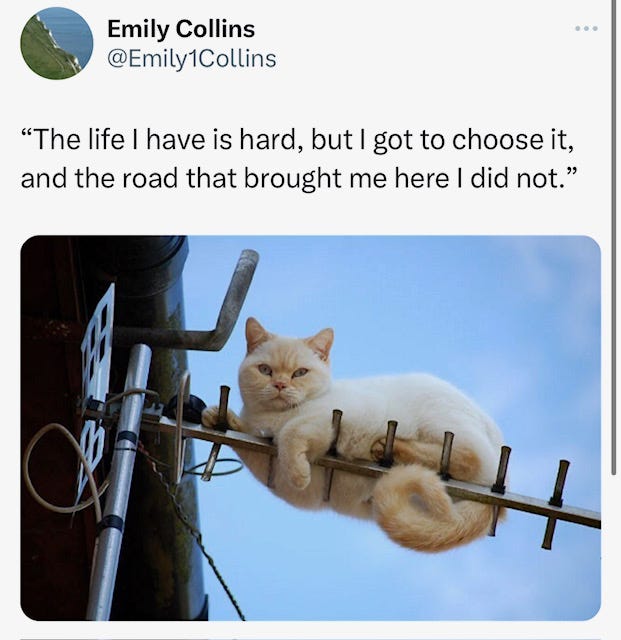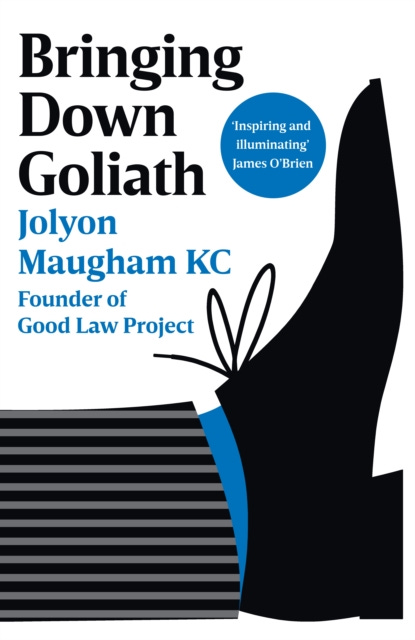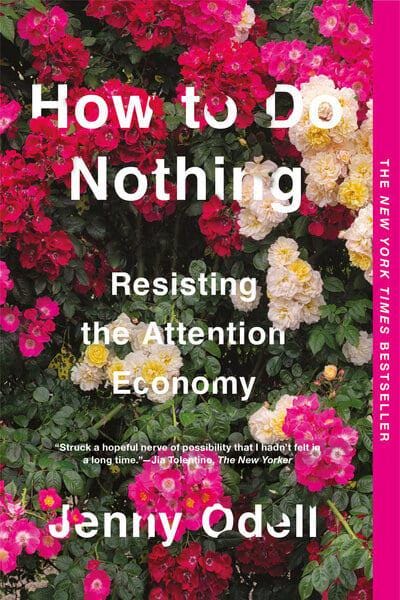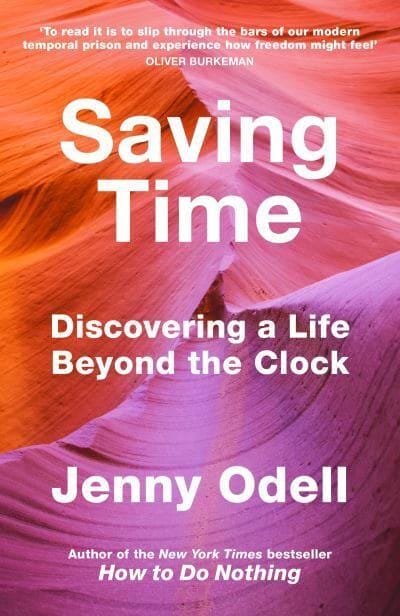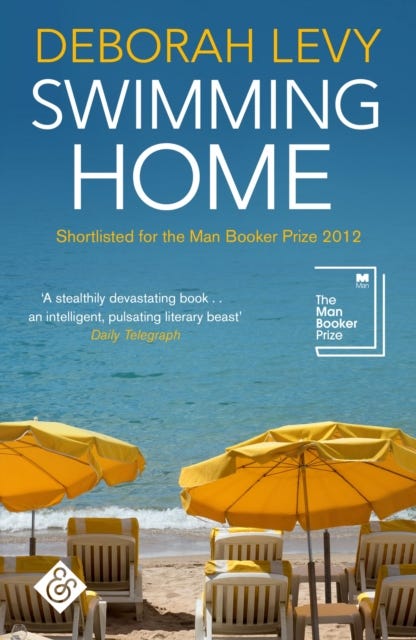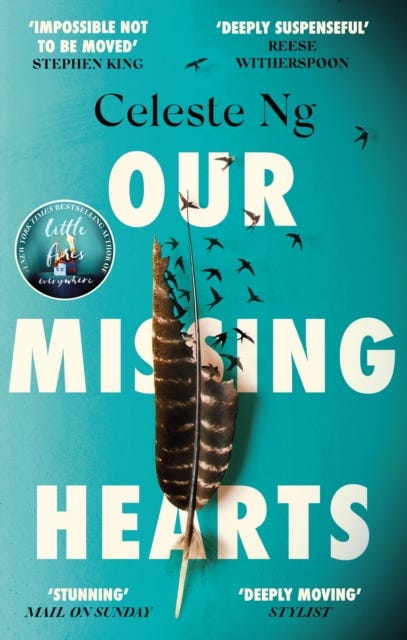Which Books Should You Be Buying This Week?
Your round-up of the newspapers' book reviews April 22/23
Well, this has been a most interesting week in the newspaper review columns! Who would have thought that book reviews could be so entertaining?
We simply must start this week with the most amusing one, which I’ll leave you to decide whether you see as a good or a bad review, it probably depends on your personal opinions on the author.
Good Law Project founder Jolyon Maugham has a book out this week, and the takedown of it in The Times’ Saturday Review section has been keeping social media amused for much of the weekend.
But first, what of the book itself?
BRINGING DOWN GOLIATH: HOW GOOD LAW CAN TOPPLE THE POWERFUL sounds incredible in theory, were it not for the man who penned it. A man who took to Twitter to brag about beating a fox to death, a man who blocks any woman (it seems mostly to be women) whose opinion he abhors (i.e. doesn’t approve of) and a man who, as Oxford University research fellow Yuan Yi Zhu (now lauded as a literary hero by some) found, is not actually very good at either toppling the powerful or writing good books about attempting to do so.
Let’s have a look at what the review said though:
“We are treated to ponderous declarations and clumsy narrations, some of which literally make no sense,” Yi Zhu wrote.
One of these is demonstrated in the Tweet below:
The book is apparently written in two parts, How The System Works which Yi Zhu describes as “a misnomer; it is a sort of rags-to-riches personal memoir with a potted explainer of the British constitution and general abuse directed at his profession, the judiciary and politicians.” And part two, Fighting Back “follows the familiar convention of legal memoirs where the author reminisces about old cases of faded fame. The twist is that many of the cases Maugham writes about were not really his.”
How strange.
Yi Zhu continues: “The real crime of this book is not that its author is insufferable. It is not that he displays an ugly streak of meanness against anyone who disagrees with him. It is that it is unbearably boring. Lawyers are supposed to be in love with the sound of their own voices; Maugham is also in love with his own prose.”
Ouch.
Maugham struck back at The Times for publishing it, calling the newspaper a ‘Brexit supporting, pro Climate Change, racist, transphobic, anti-abortion, supine to power’ (sic), so… at least he took it in good humour.
JK Rowling responded tweeting: “I’m sometimes asked how to handle bad reviews and usually answer along the lines of, ‘we’ve all had them and it’s never fun’. Sometimes you can learn from them.”
And then Maugham had a pop at her and all gender critical feminists. So, it all ended up as a bit of a scrum, albeit a very amusing one.
Now, I’m not really doing myself any favours here dedicating precious space and time to a book which has received such a scathing review, but then I did promise that my round-up would be ‘news’ from the book world and so, how could I not include this one? Especially for the pay-off line of this particular review.
“Give your money to the RSPCA but please do not buy this book. Maugham is a first-time author who should not be encouraged to reoffend ever again.”
Foxes the world-over will delight, I’m sure they will agree it couldn’t have happened to a nicer man, but I promise that if see a more glowing review of BRINGING DOWN GOLIATH in the coming weeks, I will share it with you.
However, IF you would like to purchase BRINGING DOWN GOLIATH, please feel free to do so here. And if, instead, you would like to donate to the RSPCA, please feel free to do so here.
Right, moving on, a few weeks ago one of The Book Room customers ordered Jenny Odell’s HOW TO DO NOTHING: RESISTING THE ATTENTION ECONOMY. I love these custom orders I receive from you all because they also introduce me to books that haven’t previously made my radar.
In an interview published in The Observer this weekend, William Leith described HOW TO DO NOTHING thus: “…[Odell} explains that the internet, by being such a useful servant to us, has managed to turn itself into our master; the result is that we no longer pay attention to what’s really important.
“Get off all those apps, she says, and start looking at the real world, which actually does need our attention. Barack Obama said HOW TO DO NOTHING was one of his books of the year.”
Now Odell is back with a new book SAVING TIME which looks like an equally important book and I recommended you check out the interview with Odell.
“It’s 10.30 on a sunny California morning for Odell and 5.30 on a dark British evening for me,” writes Leith at the start of his piece, “this is “clock time”, the type of time, Odell believes, that has taken over our brains, as opposed to all the other sorts of time – sundial time, tidal time, time as represented by the circadian rhythms of trees, birds, insects, reptiles and mammals, including us. There are many more types of time, too: geological time, seasonal time and, of urgent concern, climate time. There are lifespans and health spans. There is time that seems to stand still. And then there is time that comes to an end, when you die. But it’s clock time our society is focused on, clock time that harms us, divides us, steals from us and makes us destroy the planet. Clock time is all about productivity, money and economic growth. But clock time is really a fantasy.”
A friend sent me a wonderful YouTube link this weekend to an Alan Watts’ speech about money, time, ego, and this, coincidentally considering this book, is what he said: “…money is a very useful method of accounting, it’s a measure of wealth, in the same way that inches are measures of length and grams measures of weight… another thing that bothers us is time, most people nowadays say ‘I have no time’, of course you don’t because you are not aware of the present… the present is represented on your watch by a hairline, that is as thin as possible that is consistent with visibility… the present is the only real time, there is no past and there isn’t a future.”
And it seems to me this is what Odell is trying to get us to understand in this latest book.
“When Odell was a child, she tells me, her mother read her a story about a boy and a ball of thread. ‘It was from a book that my mom got from a garage sale, which she still has. A witch visits this young boy, who is impatient by nature, and gives him a ball of thread. She tells him that if he pulls the thread, time will go faster and she warns him not to pull it too much, because it only goes in one direction. Like time.’
Of course, the boy keeps pulling the thread – he always wants to get to the next stage of his life. ‘He pulls it when he wants to go home from school, but then he also pulls it because he wants to marry his sweetheart. So he’s pulling it and pulling it – and then he’s an old man.” Then, lesson learned, the witch gives him another chance. “The moral for me,” says Odell, “as a children’s story, is that you only get one life. For me, it ended up more as a story about the fact that time only goes forward. As a child, time stretches out forever in front of you. I think I was deeply terrified by that story.’”
I’d love to know the name of this book if anyone has heard of it. Odell suggests that we should perhaps not measure time in seconds, minutes and hours, days, weeks, or years, but instead in the value of transcendental moments, like falling in love.
We cannot all fall in love on request, but we can read this book and remind ourselves of the present that is forever passing us by. If you would like to buy SAVING TIME you can do so here.
Ok, so, my favourite author in the world has a book out next month and I am so excited I am admitting now this will not be the last time you hear me back mention of it over the next few weeks. Queuing for tickets to her Charleston appearance next month was more stressful than getting tickets for Glastonbury, although fortunately much cheaper than getting tickets for Madonna’s next tour (£500?!!?!).
Olivia Laing was reviewing Deborah Levy’s AUGUST BLUE for The Observer’s New Review and she described it as a ‘wistful, fabular new novel’ which sounds about right for Levy.
Our protagonist in this highly-awaited novel is Elsa M Anderson (the M stands for miracle) and she was adopted by a ‘diminutive genius’ who took her away from her foster parents and trained her to become a concert pianist having recognised her talents early on. Now an adult, Elsa has walked off stage during a performance of Rachmaninoff’s Piano Concerto No 2 in Vienna and is roaming the world teaching wealthy children when she chances upon her doppelganger in an Athens market buying two mechanical dancing horses (which fans of Levy’s non-fiction will recognise). This sets off a chain of events which sees Elsa grappling with who she is, where she came from and where she might have been headed otherwise in her life. And as she travels, this doppelganger seems to be in pursuit.
“Since the 1990s,” writes Laing, “Deborah Levy’s novels have combined a gauzy, episodic quality with pinpoint sensual detail drawn from peripatetic lives, crossing fluently between languages and national borders. Her style is full of gaps and sharp edges, circling around questions of gender and power, inheritance, autonomy and lack… the narrative here has a fittingly musical quality, running forward in spurts, pausing, repeating key phrases.”
Amber Medland also reviewed AUGUST BLUE this weekend, this time for The Telegraph. For people new to Levy’s writing, the ethereal nature of it, these gaps that Laing mentioned, the imagery, might take a bit of getting used to, and I thought that Medland addressed that well in her review:
“I had the nagging impression that ideas embedded in images… have the same quality as Levy’s writing; you either ‘get’ it, or you don’t. For those that do – myself included – AUGUST BLUE is packed with flavours such as the ‘sweet and sour, invigorating’ tomatillos that Elsa first tastes in Colombia, while the synaesthetic quality of the writing will be another of its pleasures: ‘Suddenly she had a little more kindness in D-sharp.’ The book is full of patterns, motifs and double-acts: interfering parents and prodigal children; experimental artists; colourful liquors.”
I’m very excited to read AUGUST BLUE and will be ordering my copy this week, and if you would like to you can buy it here.
If you would like to fall in love with Levy by trying a couple of paperbacks first, may I recommend the Booker Prize nominated SWIMMING HOME and HOT MILK, and of course her living autobiographies, THINGS I DON’T WANT TO KNOW, THE COST OF LIVING, and REAL ESTATE. All of which I had on sale in my pop up shop.
Let’s end with a paperback now, Celeste Ng is the award-winning author of three novels, most famous for her book, LITTLE FIRES EVERYWHERE, which was transformed into a hit Netflix series by Reece Witherspoon’s production company. She appeared in a Q&A in The Observer’s New Review this weekend as her latest book OUR MISSING HEARTS is out in paperback.
“Set in a dystopian near future, Ng’s outstanding third novel envisages a draconian US in which Asians and Asian Americans are treated with mistrust, contempt and violence. Twelve-year-old Bird was eight when his Chinese-American mother vanished, after which his father destroyed every trace of her. When Bird receives a mysterious letter from her, it sets him on a quest to uncover the cause of her disappearance. Exploring the insidious repercussions of repressive regimes, the novel is a cautionary tale, a moving family drama and a compelling testament to the power of art.”
In the interview with Hephzibah Anderson, Ng admitted to an ever-present conflict that I am very aware of as a mother/creative, that you are almost living two lives, the one in your head where you can often be a world you’re creating as a novelist, and the ‘real’ one with your child, and I know I have felt that my daughter has not always had my full attention at times when I’ve been straddling the two.
“[OUR MISSING HEARTS} came from a very personal place, with me thinking about being a creative parent and that constant fear of just not being present enough if I’m daydreaming about a plot or going on a book tour. I’d had a creative mother in my last novel, Little Fires Everywhere, and her daughter is quite accepting of the art that she makes and of the sacrifices that that requires, but I started thinking: what if that were not the case?”
But the other element that she considered, which brought the novel into existence, is much darker:
“As a person of colour, as a Chinese-American woman, a child of immigrants, a lot of things made me feel very afraid for where my country was going. I also found myself having to answer tough questions from my son like: “Does Trump hate Muslim people?” So I began thinking about parenting in a world that seemed quite scary, and when those two currents ran into each other, that was the birth of the novel.”
OUR MISSING HEARTS sounds amazing, and if you would like to order it, you can do so here.
So that’s it for this week, I hope you’ve found something to pique your interest here. There are various ways that you can support THE BOOK ROOM while I wait to find a place to reopen my physical shop. Firstly, you can buy a gift subscription for £5 a month, which not only shows your appreciation of my writing, but grants you 10% off purchases in my online shop with your own unique discount code.
You can also order from THE BOOK ROOM, you might not find something you want here in this newsletter, or even in the online shop itself, but you can send me a CUSTOM ORDER and I can usually get any book to you within 48 hours.
You also might be interested in joining one of THE BOOK ROOM’S WRITING RETREATS. Places are booking up on our next three author-led retreats and I’m thrilled that we are hosting incredible authors like Victoria Smith, Jennifer Saint and Monique Roffey. Find out more about each retreat and book here.
And if you haven’t got any money and you still want to support, then sharing this newsletter on your social media accounts might just persuade some others to sign up as subscribers or buy a book themselves!




